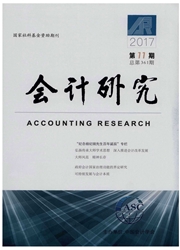

 中文摘要:
中文摘要:
非经常性损益内容的扩展与利润表列报方式的变化之间的错位,形成了非经常性损益的隐蔽空间,即利润表中的"投资收益"项目。在扭亏的压力下,上市公司会利用非经常性损益进行盈余管理。有扭亏动机且持有金融资产越多时,上市公司越偏好采用"投资收益"中的非经常性损益进行盈余管理,盈余管理的隐性化程度也越高。为了向资本市场传递突出"营业利润"主体性的盈余结构信息,上市公司利用"投资收益"中的非经常性损益进行向上盈余管理,利用"营业外收支"进行向下盈余管理。因此,非经常性损益在利润表中的隐蔽空间应该被压缩。
 英文摘要:
英文摘要:
"Investment income"has become a concealed space to hide non-recurring gains and losses since the deviation between classification rule and statement disclosure requirement about these items widening. This study presents empirical evidence that, to avoid losses,managers in listed companies do increase earnings by non-recurring gains and losses and they especially use non-recurring investment income when there are much financial assets in hand. As a result,the degree of concealment of these earnings management behavior is deeper. Under the motivation of income smoothing,which highlights the principal status of "operating profit",managers have done upward earnings management by using non-recurring gains and losses in"investment income",and have done downward earnings management by using "non-operating income and expense". In order to narrow the "concealed space"in income statement,related departments should strengthen cooperation on classification and disclosure of non-recurring gains and losses.
 同期刊论文项目
同期刊论文项目
 同项目期刊论文
同项目期刊论文
 期刊信息
期刊信息
